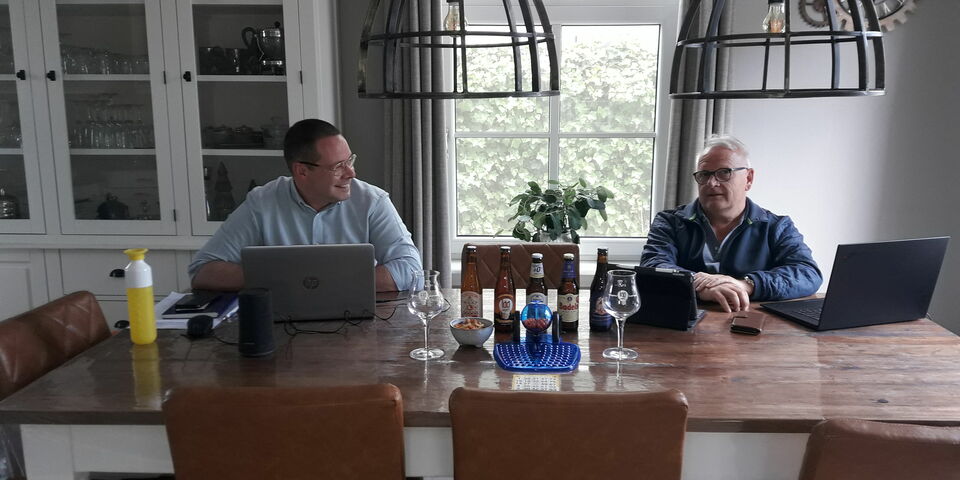“I need a sounding board”
Working from home during this time of corona crisis is slowly becoming our new normal. We are learning to work with the changing parameters and negotiating our own personal pitfalls, adjusting to the demands of homeworking, and missing the campus and each other like never before. Cursor regularly calls in on fellow homeworkers to hear how they are doing. Today, we pay a virtual visit to a duo working from home: because every Thursday afternoon, TU/e Innovation Lab director Steef Blok and his personal assistant Alwin Maas work together from Blok’s home in Kaatsheuvel.
They first started working together from home three weeks ago, Blok says. “You can simply do certain things better when you sit down at one table together. Sometimes you need to sign things, for example. In that case, sitting at a table is more convenient than using a video link.”
After five weeks of communicating exclusively online, Blok and Maas, who have been working together closely for ten years, decided it was safe to meet in person once a week. The large kitchen table in Blok’s home offers ample space for them to keep the required distance of one and a half meters, he says sitting behind that very same table. “I work from behind this table all day anyway, and not in in my office upstairs. We decided that Alwin could come over if neither of us showed any signs of a fever or a cold. He used to do so before the corona crisis as well.” Maas emphasizes that they don’t take the corona measures lightly. “At first it felt as if we were doing something that wasn’t quite right; that is why we only meet once a week maximum.”
Blok, who recently announced that he will leave Innovation Lab this fall, adds that they are careful indeed. “I’m 63 years old, which means I’m somewhat at risk – at least that’s how Alwin thinks I look like. But as director of a service, I need a sounding board, and for years now, Alwin has acted as one for me. So many things go on in the organization. You can directly respond to that following your emotions, as I’m inclined to do, but it’s wiser to put your feet up and calmly discuss it with Alwin first, during these afternoons. That has prevented me these last couple of weeks from doing anything rash. I’ve noticed that you also laugh more when you see each other in person. That too is important.”
Wet signature
Maas, who says he also paid Eindhoven Engine’s managing director Katja Pahnke a short visit this morning, adds: “In my position it’s important to also have a feeling for the people you work for. That’s more difficult when you only use video calls to stay in touch. When you ask someone how they are doing, you won’t get a complete answer that easily. But it’s also about simple things like a ‘wet’ signature I need for a registration in the trade register. We go through post items and emails, it’s really nice to do that physically.” Blok responds characteristically: “Of course, I also need to be able to see whether Alwin gains too much weight or not. That’s why it’s a good thing I can see to it here that he works hard enough.”
The work atmosphere is important, that much is clear. That is why all staff members at the Innovation Lab will meet virtually for drinks this Thursday afternoon (14 May), Blok says. “We had packages with six bottles of beer, a beer glass and a bag of nuts delivered to over forty people. I’m quiz master, apparently, and Alwin brought an actual bingo machine.”
Post-corona era
Blok is enthusiastic about how TU/e has dealt with the corona crisis. “The lecturers have handled the transition to online teaching extremely well, and the way in which the university communicated with staff members and students was very warm and showed much understanding of the human dimension. I’m very proud of that. But now we must think about the post-corona era. I think things will change permanently. We travel a lot within the Netherlands, for example, but I’m not going to travel to Utrecht for a half-hour meeting anymore. Now that people have gotten used to it, I expect we will rely more and more on video conferencing to hold meetings.”
Maas agrees. “Some services, and perhaps some departments as well, were a bit suspicious about working from home, but I think people have proven that they can handle that freedom. That’s an important lesson.” Blok: “Working from home will perhaps continue to be necessary, if the open-plan offices in Atlas can only function permanently with a lower occupancy rate. I myself hate open-plan offices and already worked from home two days a week, and I might do that more often after this is over.”



Discussion